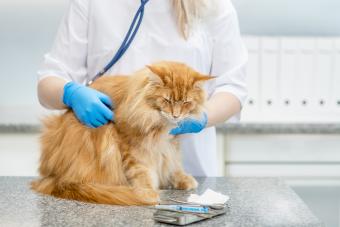
Cat scratch fever, sometimes called cat scratch disease (CSD), isn't considered a serious illness for most people. However, it can make some populations, like children and those with compromised immune systems, really ill. It's a good idea for anyone who comes into contact with cats to learn how to recognize the symptoms and the best way to treat them.
Indoor-only cats are far less likely to carry the bacteria that causes cat scratch fever. Yet another reason keeping your cat indoors is a safer option.
Symptoms of Cat Scratch Disease
Cat scratch disease is caused by Bartonella henselae bacteria and is usually contracted after being scratched by a cat. On rare occasions, the disease is caused by being scratched by animals other than cats.
According to the Centers for Disease Control and Prevention (CDC), the symptoms of cat scratch disease start to appear three to 14 days after the scratch. The symptoms may include:
- Pimples/nodules at the site of the scratch
- Swollen, tender lymph nodes
- Warm, red skin
- Fatigue
- Nausea
- Vomiting
- Fever
Although most people recover in one to four months, it can take up to a year for the swelling to disappear completely from the lymph nodes.
Is Cat Scratch Fever Dangerous?
The majority of people infected with cat scratch disease heal without needing any medical treatment. The symptoms are usually very mild and resolve on their own, like a common cold.
Even though it's called "cat scratch fever," only about 30 to 50% of those infected will actually develop a fever.
While the risk from cat scratch fever is small, it still can have severe effects for some people. The CDC estimates that approximately 4% of people who contract the disease end up in the hospital. In rare cases, it can lead to serious secondary infections such as encephalitis, endocarditis, and osteomyelitis.
People at Highest Risk
People more likely to be susceptible to severe complications from cat scratch fever are ones with a compromised or a weakened immune system, children between the ages of five and 14, people with HIV, cancer, diabetes, or a recent organ transplant. There is also some concern that cat scratch fever can cause complications for pregnant women, including miscarriage.
Treatment
If you or your child is scratched, treat it like any other minor wound. According to the CDC, you should:
- Rinse the scratch thoroughly with running water
- Wash it well with soap
- Gently pat it dry
- Do not let the cat lick the wound.
- Cover the scratch with a bandage if it's in an area that's likey to get dirty or rubbed
- Consult with your doctor if you notice any signs of infection or CSD

Using alcohol or peroxide is generally not recommended because both can increase inflammation. The scratch should heal in a few days, but if other symptoms, such as fever or swollen lymph nodes, do appear, see a doctor right away. Cat scratch disease generally does not require medical attention, but you do not want to overlook a dangerous illness by assuming that the symptoms are related to the cat scratch.
Infections that are more serious are usually treated with an antibiotic, such as azithromycin, gentamicin, doxycycline, and ciprofloxacin.
Misunderstood Disease
Cat scratch fever is not a particularly dangerous illness for most people, and the symptoms are usually very mild. Still, there's a common misconception that cat scratches are dangerous to children and can even cause death. But that's really not true.
Most illnesses that children are exposed to at school, daycare, and other activities are far more harmful and dangerous. As a result of this unfounded fear of cat scratches, parents may have cats declawed, refuse to let their children have cats as pets, or get rid of the family cat after any minor incident.
Take Precautions, but Don't Worry
Bottom line: CSD doesn't appear to have a serious effect on the majority of people who contract it, and washing a scratch and treating it with some antibiotic ointment and a bandage is usually enough to keep an infection from getting out of hand. People with suppressed immune systems, pregnant women, and young children should take the added precaution of seeking advice from their physicians and following any treatment plan prescribed.







